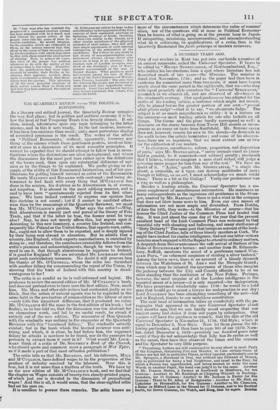THE QUARTERLY REVIEW versus THE POLITICAL ECONOMISTS.
As a literary and critical journal, the Quarterly Review occupies the very first place ; but in politics and political economy it is be- low the level of that Twopenny Trash it so fiercely abuses. It sel- dom, indeed, adventures upon any topic belonging to the latter science, and in this it acts wisely. Ill the last number, however, it has been less cautious than usual ; and a most portentous display of conceited ignorance is the result. The writer of the article on "Political Economists," without, apparently, knowing any thing of the science which these gentlemen profess, involves him- self at once in a discussion of its most recondite principles. It cannot be expected that we should attempt to follow him in inves- tigations where the distinctions are often metaphysical, and where the discussions for the most part turn rather upon the definitions of the terms used, than upon any substantial difference of opi- nion as to the things to be explained. We prefer giving an ex- ample of the ability of this Economical Aristarchus, and of his qua- lifications for putting himself forward as critic of the Economists. He treats MALTHUS and RICARDO with contempt ; and being de- termined to find fault with every thing that M'CuLLocn has done in the science, his doctrine as to Absenteeism is, of course, not forgotten. It is abused in the most edifying manner, and is said to have been "spontaneously rejected from its first utter- ance." We have indeed ventured to express our opinion that this doctrine is not sound ; but if it cannot be confuted other- wise than by the reasonings of the Quarterly Reviewer, we must beg Mr. M'CuLLocils pardon. What says the critic ?—Why, that Absenteeism is merely part and parcel of the theory of Free Trade, and that if the latter be true, the former must be true also ! Nay, he does not merely affirm this, but argues upon it. According to this new luminary, a country like Ireland, and con- sequently like Poland or the United States, that exports corn, cattle, Sac., ought not to allow them to be exported, and is deeply injured by their being sent abroad to absentees. But he admits that a country, like England, which exports manufactures, is enriched by doing so ; and therefore, the conclusion irresistibly follows from the critic's premises and acknowledgments, though he was too mole- eyed to see it, that though absenteeism be injurious to Ireland, it is good for England! We are astonished Mr. LOCKHART should print such contradictory nonsense. No doubt it will procure him the thanks of Mr. O'CoNNELL, whom the critic has furnished with another fallacy for recommending the repeal of the Union, by showing that the trade of Ireland with this country is disad- vantageous to her !
The critic is as candid as he is well-informed and logical. He professes to review the second edition of Mr. APO in.Locifs book, and does not pretend even to have seen the first edition. Now, mark him. Mr. MILL and other able writers had contended, justly as we think, that the action of natural agents was to be regarded in the same light in the production of commodities as the labour of man —only with this important difference, that it produced no value. Mr. M`CuLLoca did the same in the first edition of his book ; but finding, as he has told us, that the discussion was too abstract for an elementary work, and led to no useful result, he struck it entirely out of the new edition. The encounter of Don Quixote with the windmills was nothing to the encounter of the Quarterly Reviewer with this "barefaced fallacy." The windmills actually existed ; but in the book which the learned reviewer was criti- cising, and which, it is clear, he had before him, the supposed fallacy he attacks is nowhere to be found, nor do the passages ha pretends to extract from it exist in it! What would Mr. Locx- HART think of a critic of Dr. SOUTHEY'S Book of the Church, who should quote and comment upon a paragraph of Wat Tyler, as if it made a part of that most orthodox publication?
The critic tells us that Mr. RICARDO, and his followers, MiLL and M'CuLLoca, have defined wages to be the proportion of the produce of industry received by the labourer. Now this is true, but it is not more than a fraction of the truth. We have by us the new edition of Mr. M'CuLLocri's book, and we find that the chapter on Wages consists of twenty-two closely-printed pages, of which just one is devoted to the discussion of proportional wages ! And this is all, it would seem, that the clear-sighted critic bad set his eyes on. It is needless to pursue these remarks. The oritic knows no more of the circumstances which determine the value of commo- dities, nor of the questions still at issue in Political Economy, than he knows of what is going on at the present hour in Japan. If misquoting, misstating, misrepresenting, and misunderstanding what he is criticising, be qualifications of a critic, then is the Quarterly Economist the facile princeps of modern reviewers.


























 Previous page
Previous page